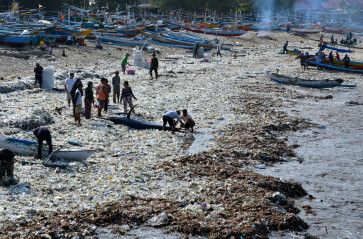In search of restorative justice
Despite protests from Jakarta, reports emerged that Saudi Arabia recently executed a second Indonesian maid within a week
Change text size
Gift Premium Articles
to Anyone

D
espite protests from Jakarta, reports emerged that Saudi Arabia recently executed a second Indonesian maid within a week.
Therefore, the foreign minister summoned the Saudi ambassador after learning that Karni binti Medi Tarsim, 37, had been beheaded without official warning.
Karni was sentenced to death in March 2013 for killing her employer's 4-year-old child. She was the second Indonesian migrant worker executed by Saudi authorities, following Siti Zaenab binti Duhri Rupa.
Siti, 47, was convicted of killing her employer's wife in 1999, but the death penalty was delayed until the youngest of the victim's sons reached puberty and was old enough to consider a request for her pardon.
Unfortunately, he did not forgive her and therefore she was executed.
However, the government said that in many cases its efforts to release a number of the accused had worked. From July 2011 to the end of March this year, the government said, it had successfully freed 238 citizens from the death penalty.
One was Satinah binti Jumadi Ahmad, who was sentenced to death in 2011 after reportedly admitting to killing her 70-year-old employer.
Satinah claimed she acted in self-defense. Days before her scheduled execution, the government stepped in with 'blood money' of 7 million Saudi riyals ' then worth about US$1.8 million. Satinah was spared.
Another was Darsem binti Dawud. She was also set free after the Indonesian government negotiated with the family of the deceased and agreed to a sum of blood money.
But the recent execution of eight drug convicts in Indonesia has led to allegations of double standards on the part of the government.
'If Indonesia wants to effectively protect Indonesians from the death penalty abroad, Indonesia should also abolish the death penalty here,' said Todung Mulya Lubis, a prominent lawyer, who failed to save two Australian drug convicts.
To understand the difference between the Indonesian criminal code and Saudi Arabia's criminal system, we have to look at the philosophy of the criminal codes in both countries.
First, Saudi Arabian law divides crimes into two categories: had (definite) and ta'zir (non-definite). The first refers to crimes for which punishments are governed by the Koran. Murder, adultery, theft, robbery and drunkenness fall under this category.
The kingdom decides the punishments for the second group after consulting with scholars, legal experts and indigenous people.
Thus, Saudi criminal laws approach restorative justice in addition to retributive justice. With restorative justice, the focus is on the victim.
Any penalty assessed for the offender is at least partly paid to the victim and punishment of the offender is, at best, a secondary goal.
Our criminal legal system is primarily based on retributive, rather than restorative justice. By retributive justice, the system is oriented mainly toward punishing the offender, not making the victim whole again.
Retributive systems occasionally have some restorative components, but they don't always work well. An offender may be required to pay restitution to the victim in addition to (or in place of) fines, but a lot of fines are never paid. It would not be any different with restitution.
Second, most criminal cases that involve Indonesian citizens occur in very private spaces, mainly in the domestic sector where legal protection is fragile and difficult.
But, if we are serious about advocating a case, an accused person could be set free. In the case of Darsem binti Dawud Tawar, another Indonesian housemaid, the murder she committed was claimed to be in self-defense against a rape attempt and she was finally freed because of the blood money paid to the family members of the deceased person.
Meanwhile, the convictions of the 'Bali Nine' were based on crimes against the public.
The latter's case, therefore, should be strictly adjudicated under the Narcotics Law, in which the maximum punishment is capital punishment.
There should be more space for restorative justice in our legal system. Among other measures, we could submit a request to pay the victim's heirs.
To date, President Joko 'Jokowi' Widodo's decision to refuse clemency for drug convicts is in accordance with the criminal law philosophy itself.
___________________
The writer is a lecturer at the Faculty of Law at the Djuanda University in Bogor, West Java.









